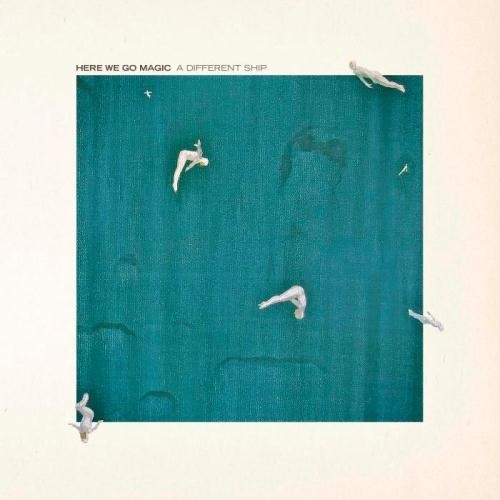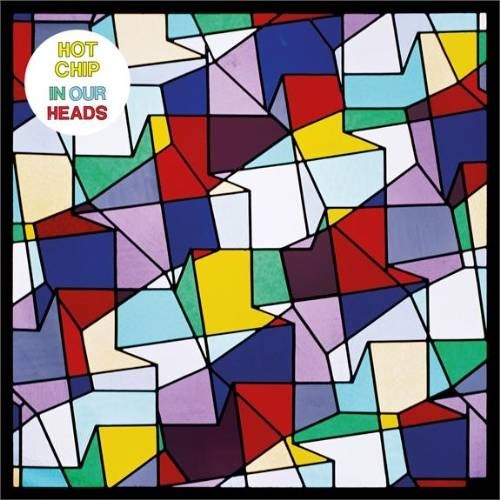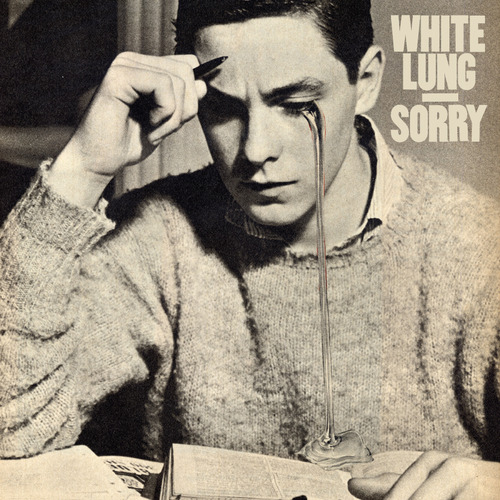
Features | Lists
By The Staff

40 :: Miguel
Kaledioscope Dream
(RCA )
“Climax” may be the best song of the year (it is), but Kaleidoscope Dream is like the album Eskimo cousin to “Climax.” Do you know what an Eskimo cousin is? Miguel would probably tell you, because chances are by the time you get that close to him you’ll be Eskimo cousins with someone you know personally. Or that person could be a bartender you trust; a coworker you’ve shared martinis with; a fitness instructor you’ve paid under the table more than once; the editor of your school newspaper; or Usher. I feel like I know Usher. Who doesn’t? The surging glee one should savor, building inside as “Climax” erupts (yes) into full-on (yes) showtune, filling one’s ear canal to the brim (yes?) is an ecstasy sustained throughout Miguel’s second album, which vicariously shares more with Usher than groin memories. Kaleidoscope Dream somehow manages to have no sense of humor about something like the full-length chuckle that is the lush “Do You?”, and sometimes the way he lords over a track can be almost pedantic. What kind of Casanova describes loving you by saying he’ll “adorn” you? It’s like he’s decorating a Christmas tree. With origami balloons. Made en masse at a so-called “dinner gathering” he forced you and all his Eskimo cousins to attend, and then only provided Chex Mix and gin. A few blurbs down Colin will call Future’s record “a goddamn party.” This record’s a goddamn party thrown by some slick dick with a clipboard. Prepare yourself to have every minute managed. Sometimes more fun in retrospect that when you’re kneedeep in it all, chances still remain it’ll leave you with a killer giftbag and a hot new someone to carry it. Which is the kind of stuff I live for.
► “Kaledioscope Dream”
► “Adorn”
Dom Sinacola

39 :: Here We Go Magic
A Different Ship
(Secretly Canadian)
The most complete effort in talented Luke Temple’s discography, A Different Ship finally brought together an imaginative songwriter’s vision with the steady hand and crystal-clear production of Nigel Godrich. How else can you describe the two-chord, endlessly-listenable and building “How Do I Know,” elevated far beyond its true status as a simple ditty to something of a gem? It’s hard to know whether the song represents Temple having successfully hacked away all non-essential components of a perfect sound, or Godrich’s ability to enhance even the most elementary idea to a place of superb pleasure.
In fact, listen to the jagged dance of “I Believe in Action,” or the majestic sway of “Alone But Moving,” or the honky-tonk of “Make Up Your Mind”—all good ideas executed with elegant simplicity. They’re enough to make one hope that Temple and Godrich will develop the same kind of ongoing collaboration as Beck and Godrich. It seems as if there’s a shared methodology located at the center of the writing and production which make the two complimentary. One could imagine far less effective iterations of this album (in fact, can probably go back further in Temple’s career and listen to them). For now, consider it immensely satisfying to hear a songwriter make good on the immense potential we’ve heard in him for so long.
► “How Do I Know”
► “Make Up Your Mind”
Conrad Amenta

38 :: Merchandise
Children of Desire
(Katorga Works)
The striking thing about Merchandise on Children of Desire is that they don’t really fit into the backstory that they’d like to. This is a band that is overflowing with things to say about the transition from youth to adulthood, but is also in danger of being overwrought in a way that almost drowns out their music, invoking overtired ideologies to articulate what they’re already saying. They might previously have been renowned for their part in the “Tampa punk scene” but none of that really matters when Carson Cox and co. play as Merchandise, because the defining concepts of songs like “Time” and “Become What You Are” are not limited to scene-specific, insular values, but instead are endlessly applicable in ways that genre cannot confine.
This is because Merchandise express things that every young person has felt, and because in doing so they don’t patronize by pretending to offer answers. The grip of depression, uncertainty, and vices such as lust press hard upon the mental state of Children of Desire’s protagonist, who desperately seeks understanding of the relationship between reality and education, experiences and growth; all components of a confused delirium that manifests itself in Merchandise’s often suffocating mix. These feelings strike so affectingly on this album because of their universality, which is why it is ignorant to attempt to figure this band simplistically as derivative of its influences. In the same way, contrary to the eager commenter you’ll always get informing you otherwise, that Charlie Brooker didn’t invent cynicism on the internet, Morrissey wasn’t the first to feel juvenile, apathetic, and hideously inadequate. These are common reference points, and Merchandise tap into these animalistic fears as well as anybody.
This band doesn’t need aesthetically pleasing, substance-free video interviews in laundromats, nor error-laden profiles drawn up by NME; the success of this album is in the logical pursuit of the end of their own ideas. The band is at its most successful when it explores adolescent concerns about what it means to be trapped between image and ideal, and ends up attempting to force a way out. These songs have a bruised, hollowed out feel about them which is not only the emotional core, but rather the result of a process of thrashing out the arrangements until they resemble something curiously close to perfection. In this sense, these songs are less the Children and more the recovering victims of desire: the conflicted result of many hours ache in order to be able to name the pain itself.
► “Time”
► “In Nightmare Room”
Matt Main

37 :: Hot Chip
In Our Heads
(Domino)
I kind of have this thing where I can’t go more than 24 hours without needing to listen to “How Do You Do?”. Like most of Hot Chip’s best songs, it splits the difference between New Order and Frankie Knuckles, riding a rubbery synth line whilst the cowbell thwacks underneath. But even by their own lofty standards, the sheer amount of hooks it crams into a five-minute space is staggering; nothing is left to chance, it gloriously climaxes with tenor Alexis Taylor’s cries of “A church is not for praying / It’s for celebrating the light that bleeds through the pain,” and then Joe Godard immediately mirrors that last line with his baritone. The sound is poured into your ears, resulting in one of the catchiest, most memorable songs of Hot Chip’s career. Their fifth album should not have songs this good.
It would have been impossible to predict this in 2005, but Hot Chip are now officially being taken for granted. They’ve always been some part of the conversation, always putting out a quality dance record every two years or so only to get conveniently ignored whenever the year-end lists come about. Part of this probably stems from the fact that they’re just so damn agreeable; they’re less rock stars than family men/nerdlingers preaching the joys of monogamy, taking great pains to show off their wedding rings in videos (in terms of indie bands so intent on reminding the listener how much they love their wives, only the Walkmen compare).
Their formula should have worn thin by now, but Hot Chip albums somehow continue to have the best production values, the best variety of hooks, and the best videos. In Our Heads further forages ahead in the vein established by 2010’s excellent One Life Stand in that three-minute singles are downplayed in favor of longer builds and more satisfying climaxes. There’s nothing here under four minutes, and relative to the classic likes of singles “Ready For the Floor” and “Over and Over,” the songs feel lusher, more thoroughly planned out with multiple layers of depth; think Cut Copy’s Zonoscope (2011). And it’s this long-form approach that results in career highlights: the underwater murk of “Flutes” and “Let Me Be Him,” a borderline tropical sounding song that actually makes convincing use of bird sounds and concludes with cascading peals of Balearic guitars. It is as if New Order commissioned a remix of a Oui (2000)-era Sea and Cake song—and it’s brilliant.
The touchstones remain: their sense of humor walks the fine line between clever and grating (“Night & Day” indeed) and like every Hot Chip album, In Our Heads could stand to be two songs shorter. But it remains a glorious dance pop record crafted by genre connoisseurs; another fantastic entry into a relatively blemish-free discography. And with opening track “Motion Sickness,” they may have stumbled onto the one topic even lamer than preaching everlasting devotion to your significant other: the nostalgic joys of listening to your portable compact disc player! Wee! Dorks.
David M. Goldstein

36 :: Future
Pluto
(Epic/Free Bandz/A1)
This whole record’s a goddamn party. “Same Damn Time” is colossal and contains a positively ebullient opening verse about shiny, sexy stuff: jellybean earrings, brand name piff, models of various ethnicities laid up at the Doubletree. R. Kelly shows up early and says, “You can always call on me / Applephone” and then, I think, turns into the sun. “You Deserve It” should be played at memorial dedications and for no reason at all. “Turn on the Lights” is desperate and shimmering and hopeful. Mike Will is Icarus, but he’s flying to the moon. He’s a shark when he lands. In this album’s thrall, we’re the sick sort of happy that happens before the world-devouring hangover and the pissed jeans. We might wake up and see a UFO. We’re alive and barely making sense, and, oh hey, rest in peace Pimp C—pass me that fucking spliff. Shit’s spinning. “My friendship was guaranteed” speaks to us, even if it’s not true. We will never end, probably. Future is outchea sipping dirty Sprite, talking like a prophet about pussy (which tastes like water) and planets (of which he is emperor). He’s slurring his speech; the balcony’s railing’s holding him up. Serious delirium, Bill Murray. Serious delirium.
► “Same Damn Time”
► “Neva End”
Colin McGowan

35 :: Jens Lekman
I Know What Love Isn't
(Secretly Canadian)
Jens Lekman doesn’t play to his strengths on his first album in five years, where the Swedish pop auteur known for his empathetic songs about girls is practically nowhere to be found. In his place stands a singer-songwriter honing a laser-like focus on a breakup he didn’t want to, but couldn’t find any way to avoid, writing about. His ear for ingenious samples—capable of transforming material both ubiquitous and hopelessly obscure into pop hooks universes removed from their sources—goes almost entirely unused. The sadness that always lingered across his back catalog comes through at the forefront of these songs, and his accompaniments, mostly a limp upright piano and the occasional saxophone solo, sound like they should be in step with the indie pop of 2012. Yet, if the album and especially first single “Erica America” can be taken as evidence, they mostly came across to listeners as deeply unfashionable.
But Lekman wouldn’t have it any other way, and he knows better than to wallow or to play the victim. His minimalist arrangements propel his songs forward without ever going for broke, his unexpected observations and the detail-heavy lines that made his earlier work so compelling prove just as vital when turned on a subject as universally mundane but as personally devastating as being broken up with. He brilliantly acknowledges his own insignificance—and his own failings in love—on songs like “The World Moves On” and “The End of the World is Bigger Than Love,” and saves the sad man with guitar act for “I Want a Pair of Cowboy Boots” and “Every Little Hair Knows Your Name,” two gutpunches that still got laughs when I saw him perform them earlier this year. That Lekman would produce another great album wasn’t really a question; that it would work the way it does, or find so many new things to say within stories told so many times before, is one of the great surprises of this young decade.
► “I Know What Love Isn’t”
► “Erica America”
Andrew Hall

34 :: Dustin Wong
Dreams Say, View, Create, Shadow Leads
(Thrill Jockey)
Ponytail came, saw, conquered, and imploded so quickly that I don’t think many people acknowledged just how unique this band really was, particularly at a time when woozy, baked-to-oblivion synths and bouncy, beach ball rhythms were all the rage. Ironically, chillwave didn’t survive much longer, but it’s already fairly easy to see what music from the late-aughts has the potential to endure. Dreams Say, View, Create, Shadow Leads, the third solo album from Ponytail guitarist Dustin Wong, seems almost unilaterally (if, perhaps unconsciously) concerned with highlighting the breadth of talent involved in his prior outfit. Ponytail were an act built from many moving and interlocking parts, and heard here, in near isolation, Wong’s exploratory guitar excursions go about as far as any pair of human hands (and, lest we forget, feet—among others things, Dreams Say is a love letter to the blossoming effects of the foot pedal) can to reiterate just how technically proficient each member of his former band was, purposefully isolating his distinctive approach in one single-minded, sixteen-track push toward enlightenment.
But even taken on its own terms, Dreams Say is an intriguing, hypnotizing experience. The album’s title may comprise a string of seemingly unrelated, vaguely evocative verbs, but they ably outline the visual and aural parameters that this music suggests—the leads, as they were, speaking, absorbing, embodying, and refracting the inner workings of Wong’s feverish imagination. Taken individually, each piece, while undoubtedly impressive, lacks the contextual thrill the greater tapestry rewards. Wong works in repetition, patterns, and cyclical gestures, the entirety of the experience less a series of individuated scenes then a symmetrically mapped panorama. In an intimate sense, then, Dreams Say is a privatized index of Wong’s aesthetic proclivities to date; from another angle—and in this way the record feels in spiritual accord with such other recent singular technical achievements as One Pig (2011), New History Warfare Vol. 2: Judges (2011), and The Matriarch and the Wrong Kind of Flowers (2012)—it’s a showcase for the lengths a single player can push the expressive powers of his chosen medium.
► “Pink Diamond”
► “Diagonally Talking Echo”
Jordan Cronk

33 :: White Lung
Sorry
(Deranged)
Laying things out works: indulging in silence, letting thoughts run on, burrowing into detail, slowing things down. Meandering. That approach tends to produce the type of things we refer to as “epic.” But “epic” doesn’t mean the same thing as “long,” and I think there’s a certain epic catharsis to experiencing something that has been edited down and all that’s left is pure this-ness. Sorry, all nineteen minutes of it, features an astounding lack of redundancy. At the same time, calling this “punk” sells the ingenuity here short. I mean, it is that—punk—but also it is intricate, dynamic, and sinewy. Stretched out, water added, regrown, there may even be a crazy good prog album here. As it is, Sorry is epic because it finishes every thought you’ve ever had about music for you. Loudly, with gusto, to the point.
Mark Abraham

32 :: Disasterpeace
Fez OST
(Self-released)
The game this buzzing collection of electronica soundtracks is a color-drenched adventure about a misshapen marshmallow puff in a fez putting his world back together. It’s not a game that talks at you—not a quasi-intellectual fever dream tubing through its own ass like Braid or a goofball tale about childhood like a Tim Schafer game—but it tells a story in its own laconic way, through its dreary graveyards, tangerine sunset harbors, vine-swallowed jungles, and this soundtrack, which pulses, shatters, and growls as if emanating the from the dark, bright, blue, black sky of the world your little sentient marshmallow is exploring. In the same way the game communicates through layers of simple shapes and colors, Disasterpeace’s score communicates through minute, intersecting bursts of sound. They combine to create the sensation of playing in your backyard sandbox as a kid and feeling dimensions away from home.
Like listening to Johnny Greenwood’s There Will Be Blood OST or Jerry Goldsmith’s score for Chinatown, listening to Disasterpeace’s soundtrack mostly recalls the art to which it is tethered—in my head, I’m platforming and flipping dimensions when I throw it on to serve as Colin Unclogs His Kitchen Sink OST—but sometimes it’s the only thing I want to listen to. When I’m too pissed to function, and just want to dream about fruit-colored shapes and pixilated seafoam. When I want to feel dimensions away from home.
Colin McGowan

31 :: John Talabot
ƒIN
(Permanent Vacation)
I love this John Talabot record for many of the same reasons I loved Nicolas Jaar’s output last year: ƒIN, like Space is Only Noise, is a singular record that pointedly transgresses the stiff-upper-lipped boundaries that face deep house producers when it comes to formulating pop music. It also includes the most inventive experimentation with the role of organic sounds in electronic music that I’ve heard this year, another testament to the way both producers seem to be laughing at the sheer obviousness of convention that so many similar artists can’t seem to escape.
The deliberately disruptive placement of the unexpected into often familiar and repetitive genres becomes entrancing when writ large in the form of an album like ƒIN. Take “Oro y Sangre” as an example of this restless humour, which begins with a creaking door, an ominously lurching beat, and a victim’s scream before revealing a striking self-awareness of these superficial elements at its core, where it absorbs all these sounds into a futuristic cacophony of an outro. Often songs throbs with an inimitable relentlessness, but they never overpower; it would not be over-reaching to call certain passages meditative. But like all great art, Talabot turns from cliché just as he looks certain to employ it, and permits the listener no real moments of downtime, not looking especially forwards but around, creating a spinning, dizzyingly encompassing effect that whips from surreal to abstract before dumping us frequently back on the hard concrete of rhythm. When the end arrives, it’s because ƒIN has exhausted us—its dazzling composition means it could never be the other way around.





